It’s funny sometimes how the future works. It’s funny all the time how humans work. You look around at “us” over the past 315,000 years, the entire history of the Homo sapiens species of Earth dwelling animals, from fire and stone-hewn arrowheads, to fusion and iPhones, it seems our purpose in life is to make life easier for ourselves. And in the making of that, to bring about a higher quality of life. Without questioning how we get there. I mean, WHO questions the desire for a higher quality of life?
There’s A LOT of money in that, right? Capitalism is built on that premise—for proof: instead of tuning your mind out, checking your social media, or using the toilet at the next commercial during your binge-watching fest, tune in to what the commercials are selling you. They aren’t selling you stuff, or junk, or product; they are selling you a “higher quality of life.” Every single one of them—from Ozempic to Channel No. 5 to LEMU EMU (and Doug), and Uber Eats—essential components of the well-lived life (so say their marketers).
Spoiler alert: they ARE selling you an awful lot of junk though.
As I’m getting older, I’m becoming less impressed with self-improvement by way of capitalism. Instead, I’m resonating strongly with values and conceptual ways of Being that include minimalism, solitude, silence, nature, authenticity, healing, wisdom, connection, and growth through inner development—the growth of Soul. “Is it real?” is an excellent guiding question in my daily life right now.
“Is it real?”
In the evolution and Alchemy of me, I’m seriously questioning the apparent purpose of our species—that in the making of life to be easier, we invented and continue to invent technology so that sellers can sell it to us to bring about a higher quality of life.
I’m calling bullshit on that!
The Making of a Luddite
A Luddite is a person who opposes or resists new technologies, particularly due to concerns about their impact on jobs and traditional ways of life.
The original Luddites were British weavers and textile workers who objected to the increased use of mechanized looms and knitting frames. Most were trained artisans who had spent years learning their craft, and they feared that unskilled machine operators were robbing them of their livelihood. When the economic pressures of the Napoleonic Wars made the cheap competition of early textile factories particularly threatening to the artisans, a few desperate weavers began breaking into factories and smashing textile machines. They called themselves “Luddites” after Ned Ludd, a young apprentice who was rumored to have wrecked a textile apparatus in 1779.
There’s no evidence Ludd actually existed—like Robin Hood, he was said to reside in Sherwood Forest—but he eventually became the mythical leader of the movement. The protestors claimed to be following orders from “General Ludd,” and they even issued manifestoes and threatening letters under his name.
(Source: https://www.history.com/articles/who-were-the-luddites)
I think I’m a Luddite, in training. Technically (see what I did there?), a Luddite probably shouldn’t have an iPad, Substack page, iPhone, or even a microwave (let alone an espresso machine—DON’T YOU DARE TAKE AWAY MY BREVILLE!!!). Hey, I said I’m a Luddite trainee, so give me some space and grace, here, would ya?
But he seemed so nice…
Sales people, bless their hearts, have to be nice, right? I mean, even if they aren’t nice people, to sell their crap (er, product), they have to come across as likeable. Or else you take your business elsewhere. In addition to buying what they’re selling, we’re also buying a little piece of the seller. So it’s in the seller’s best interest to be appealing, to appear kind, maybe to be soft-spoken, humble, and come across as sincere. The BEST sellers are our greatest actors. Make no bones about that.
Did you happen to catch 60 Minutes last Sunday? If so or if not, meet (again?) this guy:
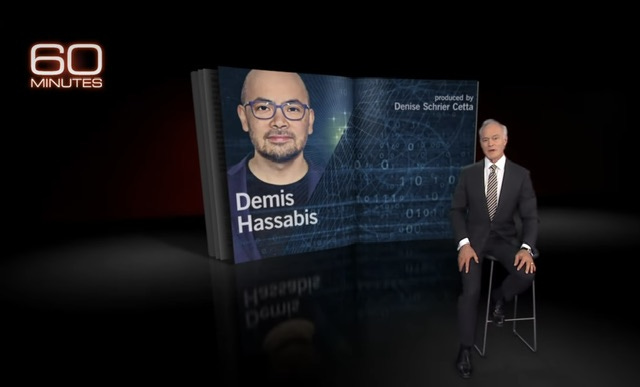
That’s Demis Hassabis behind Scott Pelley there. Before Sunday night at 7:05pm, I had no idea who Demis Hassabis was. Dr. Hassabis is a Nobel Laureate scientist, and the cofounder and CEO of Google’s Artificial Intelligence division called “Deep Mind.” A smart guy. A soft-spoken man. Humble even, sincere. With a nice smile. He seems quite likable. A great actor even!
See where I’m going here?
This is about Artificial Intelligence. This is about malevolent intentions. This is about THE major shortcoming of Science. This is about bad actors and those who might mean well, but have no fucking idea how insidious the consequences can be. Or more likely, intentionally blind to them. This is about human nature.
We’re being sold Artificial Intelligence. And we’re buying. With no questions asked.
We have no choice.
The 60 Minutes segment was chilling. Nightmare-inducing actually, but a nightmare we’re all about to have even though it is intentionally creeping up on us with every AI assistant; Alexa request; Google search; new self-driving vehicle; video game console and auxiliary virtual reality device; altered photograph; drone; fraudulently claimed (as human created) works of art and literature; and text-correcting, text enhancing text. ALL in the name of increasing the quality of our life.
Hassabis called the potential of AI “Radical Abundance—the elimination of scarcity” from our lives, and in just a few years too. Take a moment and let those words wash over you: “Radical Abundance. The elimination of scarcity.” That’s quite a product tag-line, don’t you think? He’s promising AI will do that—make scarcity a thing of the past, and seemingly turn every neighborhood into gardens of Eden. But Hassabis offers absolutely NO vision or explanation of what that means, what that looks like, how AI will manifest that, nor does he articulate the costs involved in even trying to get just a little ways there. (I’ll explain why he doesn’t do any of this in a bit.). His intentional use of emotionally-packed language is actually a rose-colored rationalization of something humans will not be able to control—so, many engineers and scientists out there on the creating-edge of development are already starting in with their excuses, justifications, and alibis. Hassabis is making quite a name (and MONEY) for himself by being on the leading edge of the AI game. I mean, he’s a Nobel Prize winner! So it’s in his best interest to sell it to the masses and to make the masses feel as if they need it, otherwise “your life is going to continue to be shit.” (My quote—but I’m not saying anything new by saying that; it’s just the opposite side of the capitalistic coin). In order to have a high quality of life in the future with the product I’m selling you, I have to make you feel like your life is pretty shitty right now. Otherwise, how can I sell you what I’m selling?
Here’s the real reason for me writing this
A couple weeks ago, I actually wrote about all this already. But it was framed using Jurassic Park as a metaphor. I had no idea 60 Minutes was going to feature a Nobel Laureate snake-oil salesman just a few weeks later. In the Jurassic Park piece, I mentioned a couple quotes from author Micheal Crichton that he ascribed to his fictional Dr. Ian Malcolm. These quotes have stayed with me—as a science geek and former biology teacher, they resonated strongly with my dual senses of a rational, science-oriented, knowledge-seeking mind, partnered with a strong sense of moral obligation and ethical responsibility (ie, I cared about kids!). I’ve used one of the quotes, a single sentence, quite a lot:
“Your scientists were so preoccupied with whether they could, they never stopped to think whether they should.”
This sentence was ringing LOUDLY in my ears during the entire 60 Minutes piece. If Scott Pelley wasn’t going to say it to Hassabis during the interview (and he didn’t), I wanted to yell it at the screen! (Pelley SHOULD have said it. He should have asked different, better questions. Starting with “Why?”). Now, even I will admit to some of the advancements that AI is already bringing us—most notably in the health sciences arena. But severe, “not-thought-through-completely” problems exist even there. Problems like “who will benefit? Who will have access to the advancements and who won’t? What are the costs involved—monetarily, physically, psychically, socially, emotionally, environmentally…? Who gets to decide all this?”
NOTE: There are ALWAYS costs.
Some will argue “Kert, those advancements will eliminate diseases from the human species. You want to live the highest quality of life possible, right? What do you have against THAT?” I have nothing against that, I’m already living my highest quality of life possible—but I also don’t think all means justify all ends. My skeptical radar shoots into the red zone every time I hear claims I know to be both hubris and outrageous. During the entire 60 Minute segment, my radar was screaming “DANGER: HIGH ALERT BULLSHIT WARNING!!!” Here’s an exact quote from Demis Hassabis from the Pelley interview: “Within the decade, we can cure all disease with the help of AI.” He said that!
Were I Scott Pelley: “Really? All disease? Cancer? Alzheimer’s? ALS? Schizophrenia? Dementia? And everywhere? Even in, say, Ruwanda? Bangladesh? Russia? Gaza? Syria? Iran? Mexico City? Mar-a-Lago? El Salvador? Greenland? For everyone? I’m sure for the billionaire oligarch, but also for the undocumented farm-worker from southern Mexico who is living in poverty out of her car while trying to feed her family? How about the homeless Vet? For all species too? (Can you say Bird Flu?) Won’t ‘Big Pharma’ have something to say about all this? Doesn’t this put Big Pharma out of big business? (Not a deal-breaker for me, btw!)
“Cure all disease;” another wonderful tag-line from an adept salesman. Because even here, he offers NO vision or example of how this will manifest in practice. He can’t; so he intentionally uses, again, emotionally-impacting, sexy language solely for justification. Are we all going to have to become genetically modified organisms to pull this off? Have chips implanted in the backs of our necks? Become lifetime drug users?
But here’s where things get alarming (yep, they haven’t been alarming yet!). And ironic. Because in 1993, Michael Crichton wrote a couple of other prescient paragraphs and embedded them deep in the pages of Jurassic Park; paragraphs that need to serve as a clarion call to all thoughtful people who believe in science. Were I Scott Pelley, I’d have read those lines to Hassabis and asked him to respond. Right after, for the sake of some context that is, Hassabis said this, and I quote:
“There’s two worries that I worry about. One is that bad actors, humans who use these systems will repurpose them for harmful ends. And the second thing is the AI systems themselves: as they become more autonomous and more powerful, can we make sure that we can keep control of the systems, that they’re aligned with our values, that they’re doing what we want that benefits society, um, and they stay on guard rails.”
(Bold font mine)
Hey Demis, I have the answer to those worries: One: bad actors are inevitable and will ABSOLUTELY use AI for nefarious, even evil purposes (it’s happening now!). Name a technology of any kind in which this has not happened? And two: it is the nature of chaos theory, as he should know (as Dr. Ian Malcolm knew), that we cannot keep control of systems such as these that are being unleashed upon the world. This was Crichton’s entire thesis when he penned Jurassic Park. Crichton used GMO’d dinosaurs. Mary Shelley used Frankenstein and his monster. Oppenheimer used the atomic bomb. Hassabis and his fellow collaborators and competitors, world-wide, are using AI now.
And here’s the most absurd and alarming thing of all. Hassabis is only paying lip service to “his worries.” He doesn’t give a SHIT about those consequences. He’s in a never-ending race to the top—a very lucrative top. But he knows he has to say those things so that he can, at some point in the not too distant future, say “But I told you so. And because I told you so, I ain’t responsible for any of this bad stuff now happening.”
AI is BIG MONEY! And when BIG MONEY is involved, morals and ethics are hardly ever found. A very small number of already “money rich” people are going to be making even more money from all AI applications. For the rest of us, those of us who won’t see our bank accounts increase a single cent, the sellers doing the selling are only hoping that: 1. we don’t think too much about it; 2. we buy what they’re selling, including the messaging behind the packaging and product, without asking any questions; and 3. we become addicted yet again to the latest thing that promises a better life. Those doing the selling actually have all this pretty easy—because this is exactly what we humans do, as proven over and over and over again. Besides, for the most part, we are powerless to do anything different or oppose the massive inertia as funded by the ruling class of the mega-money-wealthy. Today’s scientists, in the lucrative fields involving high tech, are finding themselves in very comfortable spaces at those top places. And you bet they’re being paid!
What all the rest of us have to realize is actually something that breaks my heart—because I loved science, wanted to be a scientist, and taught science for 15 years turning many a student on to science during those years. All of science doesn’t give a shit about the human consequences of technological advances. (What the Luddites were worried about in the early 1800’s DID come to pass, afterall.) It’s not the job (nay, worry) of science to worry about that. So “they” say. And that’s what breaks my heart and really pisses me off—because they SHOULD care; they should build permanent, unbeatable guardrails. They should have morals, and ethics, and know when to stop, when the “keep going on” might lead to great harm. They should know how to absolutely and completely control their monsters.
Here’s what Crichton had Dr. Malcolm say that has turned me into a Luddite-in-training (keep in mind he wrote this over 30 years ago—in the late 80’s and early 90’s); here’s what I would have read to Hassabis:
“And now chaos theory proves that unpredictability is built into our daily lives. It is as mundane as the rainstorm we cannot predict. And so the grand vision of science, hundreds of years old—the dream of total control—has died, in our century. And with it much of the justification, the rationale for science to do what it does. And for us to listen to it. Science has always said that it may not know everything now but it will know, eventually. But now we see that isn’t true. It is an idle boast. As foolish, and as misguided, as the child who jumps off a building because he thinks he can fly.
“We are witnessing the end of the scientific era. Science, like other outmoded systems, is destroying itself. As it gains in power, it proves itself incapable of handling the power. Because things are going very fast now. Fifty years ago, everyone was gaga over the atomic bomb. That was power. No one could imagine anything more. Yet, a bare decade after the bomb, we began to have genetic power. And genetic power is far more potent than atomic power. And it will be in everyone’s hands. It will be in kits for backyard gardeners. Experiments for schoolchildren. Cheap labs for terrorists and dictators. And that will force everyone to ask the same question—What should I do with my power?—which is the very question science says it cannot answer.”
“So what will happen?” Ellie asked.
Malcolm shrugged. “A change.”
“What kind of change?”
“All major changes are like a death,” he said. “You can’t see to the other side until you are there.”
Malcolm sighed. “Do you have any idea,” he said, “how unlikely it is that you, or any of us, will get off this island alive?”
“We are witnessing the end of the scientific era. Science, like other outmoded systems, is destroying itself. As it gains in power, it proves itself incapable of handling the power. Because things are going very fast now. […] And that will force everyone to ask the same question—What should I do with my power?—which is the very question science says it cannot answer.”
And AI power is far more potent than genetic power! And it is already in everyone’s hands.
Science, and scientists, and Demis Hassabis all say they cannot answer the question “What should I do with my power.” But this doesn’t stop them from trying to amass more and more power. Instead, as Hassabis also said in the interview, “you know, I think we need new, great philosophers to come about, hopefully in the next 5 to 10 years, to help understand the implications of this.” And there, in that one sentence, is his abdication of all responsibility. In that one sentence, he’s actually saying:
“It’s not my job, my fault, or my duty to be concerned with the consequences and implications of something that will literally and fundamentally change what it means to be human. I’m just trying to get there first. So, you know those two worries I talked about earlier? Yeah, I was just bullshitting you. Philosophers, wherever you are, it’s up to you to be the guardrails. It’s on YOU dudes and dudettes! Not me. Oh, and good luck with that.”
It’s actually on all of us. Because…
… AI is not our friend. Despite the binary entities like Chat GPT or Grok or Alexa or even Siri, that are getting more adept at using language we humans perceive as coming “from the heart,” AI won’t ever have a heart. But humans get fooled—we want to believe AI has our best interest in mind. Yet, it’s much more insidious than that. Most of us think AI is something “yet to come;” picturing, maybe, a not-so-future “RoboMart” where anyone can go down to test drive a personal robot who will vacuum, cook, respond to questions, help with homework, make calls, clean the windows, dust, shampoo the dog, feed the baby, baby sit, console broken hearts, be our friend, gratify desires…all for the low, low price of…what? But hurry, sale ends soon and supplies won’t last. Until, that is, they can make more of themselves.
We humans are also being sold on the fraudulent idea that creating the capacity to increase AI production will concurrently create or “bring back” good ol’ American jobs. But this isn’t true. Those jobs are being filled, even now, by AI-powered robotics. The British Luddites of the 1800’s are still speaking to us from their graves. This isn’t some dystopian future; what we don’t realize is that it’s already here. It’s our dystopian present that we’ve bought because we are being sold a bill of goods we’re told we cannot do without, and that it’s “coming”—it doesn’t matter if you or I don’t want it. But it's not coming; it’s not “on the way.”
You have it now, in the palm of your hand (literally); and it has touched your life in ways you have no idea.
Good and bad.
The “bad actors” are already using AI in harmful ways. Insincere people are already using AI to publish work they are passing off as their own. We can no longer look at a contemporary photograph taken and stored digitally and trust that what we are seeing is actually what was reality. AI is already manipulating me with every internet-based search and social media post—feeding back to me what “it” thinks I want to read and know and buy—from biased news, to YouTube and Netflix videos I will like, to the next brand of shoes I’ll need.
I’m just told I have to always remember: “it’s all for my own good!”
A Synchronistic Irony
As I was “putting to bed” the last draft of this post, Thursday morning, my Daily Good feed sent me the day’s offering titled “Will AI Strengthen or Weaken Human Connections?”
Here’s that screenshot:
In the article, “Michelle Culver explores technology's double-edged sword and how we can cultivate meaningful relationships in a rapidly evolving digital age.” If you have a child, know a child, know someone who has a child, or cares about our future in any way, the article is worth the read. We HAVE to engage with the philosophical questions AI is prompting our species to grapple with. In Hassabis’ words, we each have to become Philosophers of Artificial Intelligence. We are the guardrails, even barricades, the technology needs—nay, WE need—to establish and keep healthy and benevolent controls on AI’s growth. But there’s a huge caveat in that.
I don’t know Michelle Culver either. But even though the article presents as a hopeful prompt that “we gotta do something,” (without positing a single example; in fact, she’s an AI apologist, just like Hassabis), she’s illustrating a remarkable lack of understanding about humans. AKA—she seems to be “selling the snake oil” too; by trying to tell us “it doesn’t taste as bad as you think it tastes. Here, have some. Trust me.”
Here’s her last paragraph from the article:
Spot the caveat? It’s hidden in her plea.
“While new products and innovations are launched regularly without a meaningful sense of their downstream impact….” […] “we can make sure that young people don’t become passive recipients of a flood of technologies that further disconnect us all.”
Humans, today, don’t work like that. THAT’s the huge caveat. We no longer care about “downstream impacts.” We just want to “get there first;” make the most money; have the latest, sexiest stuff; and care not about consequences to health—human, environmental, or otherwise. Using Culver’s own four quadrant matrix, it is human nature to “fall below the line.” It takes effort to “stay above the line.” But remember, technology’s purpose is to reduce human effort—we get there, below the line, by buying into the “higher quality of life” myth.
As for young people, just like old people, just like all people, when it comes to technology, we’re all ALREADY passive recipients—the technology we have in our hands, in front of our faces, covering our ears and eyes, ALREADY disconnects us all. THIS is Culver’s naïveté. Or rose-colored ignorance. If you need evidence outside your own household, when next you are out and about (even say, at a restaurant), have a look to see how many humans are engaged in their tech instead of the human that is right next to them. It’s no longer unusual to see a “young/old” family at a restaurant all looking down at their screens in silence—or to see at human gatherings (family or otherwise), how devices are being used to keep us, but especially kids, from being fully present with the other humans in the room (and you were skeptical an AI screen could babysit!).
Like Hassabis, Culver doesn’t tell us how we should “make sure” we don’t succumb to “the flood of technologies that further disconnect us all.” Apparently, that too must be up to the hoped-for philosopher/saviors—she actually says this too! All I know is, those philosopher/saviors won’t be human.
Relational bots already exist to advise, teach, guide, direct, provide companionship, console, cheer up, game with, fall in love with, engage in sexual fantasy, rationalize, and more. If you have a best friend in life, an actual human best friend (okay, or dog!), every characteristic of that friend (emotional, psychological, cognitive, relational, even, god should forbid, physical) is finding their way into relational bots.

It’s worth watching.
And since we’re talking movies now…
In 2008, the animators at Disney/Pixar also predicted this—the consequences of allowing technology to have free-reign in our world. (So maybe they, too, qualify as philosopher/saviors!) And they were so bold, so prescient, and so accurate, they even animated what we, the human species, will inevitably evolve into, and in short order, on our quest to have technology make our lives easier, our quality of life “better.”
This, their prescient prediction come true:
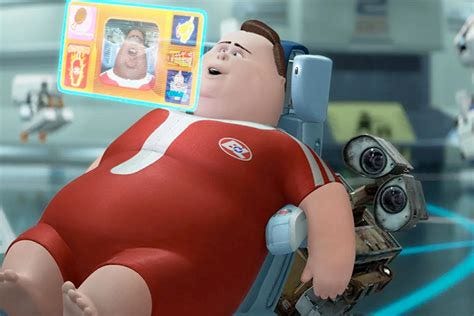

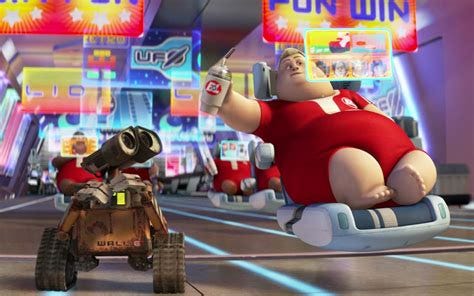
FYI, this is what “passive recipients” look like. This is what “below the line” living looks like. This is our future; at least for those in the Western world where we have the money and means to buy (be sold) the snake oil of this higher quality of life. THIS is also what Radical Abundance looks like, y’all.
Makes me just want to unplug every device I own. When I do that, I discover my quality of life, ironically, not miraculously, always seems to get better. Artificial Intelligence not necessary—I can just use my own.
Funny how that works.
“Do you have any idea how unlikely it is that you, or any of us, will get off this island alive?”
Always and Ubuntu,
~ k
🙏🏼









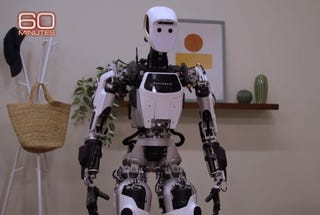

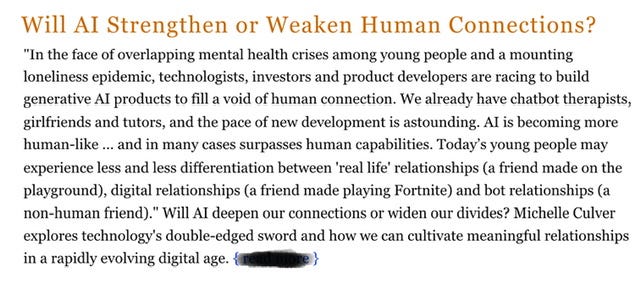



I have long been professing this treatise. It is SO completely FRIGHTENING that the average person has absolutely NO control over his own destiny any more. Watch I ROBOT with Will Smith and you will be able to visualize what your future will look like.
Wow, Kert! What a provocative piece. Social media did not make us more social. Instead it contributed to a deep and nearly indescribable loneliness. Artificial intelligence will not make us more intelligent. Intelligence is not just retained information; it's insight, nuance, and revelation. Artificial intelligence can only mimic knowledge and it cannot replicate self-knowledge.
What is going down the drain here is our collective memory, our collective moral and civil code of what it means to be human. And meaning is what gives life purpose, which is why I think it feels so good to digitally unplug, at least from time to time -- so that we don't forget how to find meaning and thus purpose. That is an action of the heart and AI cannot replicate that.
Good writing, Kert. I'll be chewing on this for some time, I'm sure. And for now, I'm going to disconnect and go sit on the back porch with my dog. Big hugs, ~stephanie